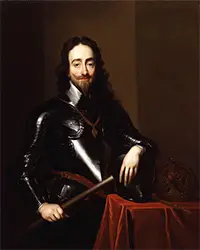The English Civil Wars
The English Civil Wars were a devastating series of skirmishes and battles that went on for nearly a decade in the mid-17th Century, pitting supporters of and soldiers for the king against those who supported Parliament. The fighting was the violent result of a series of escalating tensions and events in the struggle for supremacy between King Charles I and Parliament. During the war, the Royalist forces were known as Cavaliers and the Parliamentarians were known as Roundheads. The king had married Henrietta Maria, a Catholic, and this alienated many people in England who had embraced the Church of England variant of Protestantism (as begun by Henry VIII and extended by Edward VI and Elizabeth I. Further, the queen refused to participate in official Protestant ceremonies. Marrying Henrietta Maria was the first of many things that Charles did that many of his subjects or his lawmakers did not like. Also on the religious front, Charles managed to alienate both Catholics and Protestants with various religious policies that he pursued. He also angered many people in Scotland, his homeland, when he insisted, without consulting the Scottish Parliament, that they use a new prayer book that looked suspiciously like the English Book of Common Prayer. Riots accompanied the first use of the new prayer book, and the Church of Scotland's General Assembly condemned the prayer book in 1638 and declared itself fully independent of the Church of England. Scottish political leaders responded by declaring the National Covenant, a collection of grievances against the new policies of the king and his ministers. 
Another point of contention with the people who ended up being Charles's enemies was the king's dependence on Buckingham. The young king allowed Buckingham to direct foreign policy, including authorizing intervention in the war against both France and Spain. Charles also on one occasion imprisoned two Members of Parliament who had spoken out against Buckingham. (He later had them released.) Possibly the main point of difference between King Charles I and everyone else who lived in England was the relationship between the king and his subjects. Charles was very much of the opinion that he had been granted the kingship by divine right and that it was the duty of the people of England to do what he told them to do. The members of Parliament certainly disagreed with that philosophy. Many in Parliament did not favor war with either France or Spain. Enough members of Parliament objected to Charles's request for money to fund a war in Europe that the funding was denied. In response, Charles dissolved Parliament. Charles took the same action the following year. When France defeated English forces on the field of battle, many in England blamed Buckingham and sought his removal through impeachment. In order to prevent his being removed from office, Charles dissolved Parliament. In fact, Buckingham was assassinated in 1628. The year before, with no Parliament to approve or reject, Charles instituted a "forced loan," for which people could be imprisoned for not paying. Feeling the need for more approval, Charles recalled Parliament in 1628. Lawmakers and various other nobles forced Charles to accept the Petition of Right, which, among other things, required the king to seek Parliament's approval before launching any other tax collection schemes. Also in the Petition of Right were prohibitions on the king's declaring martial law, requiring people to keep troops in their homes, and imprisoning people without due process of law. The king promised to abide by the conditions of the Petition and did so for a number of weeks; he then dissolved Parliament. In January 1629, Charles called Parliament into session. Two months later, the king dissolved Parliament. It would not meet again for another 11 years. Next page > The Fighting Begins > Page 1, 2, 3 |
|
Social Studies for Kids
copyright 2002–2024
David White




